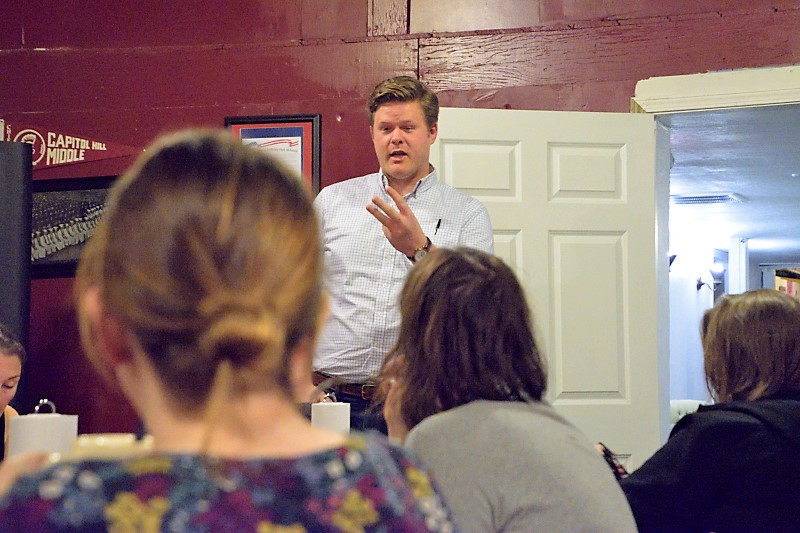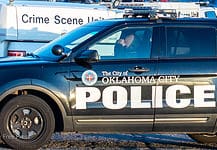Last Updated on April 5, 2017, 3:25 PM | Published: February 27, 2017
Two meetings on either end of Friday at popular restaurants in Oklahoma City gave Rep. Forrest Bennett, D-OKC, a way to keep up with constituents whose votes he won in November. And those District 92 constituents had done their homework.
Michelle came to find out about why Oklahoma’s Gross Production Tax is so low in these years of revenue failure. She’s a nurse.
And Caleb rode his bike to the same meeting to ask about an increased tax on gasoline as one avenue for responding to Oklahoma’s revenue problems.
Later in the day, Marty wanted to ask about why education funding has not been addressed. His partner, Jo Beth was concerned that the legislature continues to try new ways of cutting an already bare-bones budget while wanting to raise use and service taxes on common people but not the well-to-do.
It was one of many ways the Democrat continues contact he initiated with District 92 residents during the campaign last year. He knocked through the district several times before winning in November.
House District 92 is a diverse challenge to anyone who wants to represent its residents.
It stretches across many cultures and neighborhoods from Plaza Mayor Mall at I-35 and I-240 up across the core of the historic south side and Capitol Hill. Then, further north, the district jumps the Oklahoma River to include downtown and then west to State Fair Park at NW 10th Street and I-44.
Learning
At the end of the day Bennett told Free Press that he learned several things from those events.
“Basically, I learned that people are fed up watching legislators talk big about budget solutions before session starts, then sort of walk it back when negotiations actually start,” Bennett said.
“I learned that they’re very engaged, and I’m regularly asked by people of all stripes how they can be effective at dialogging with legislators,” he said.
“And the vast majority of them – Republican, Democrat and in between – want to know how to effectively engage their state government in order to tell them to stop with the sensational, social issue legislation and get back to fixing the budget and making the economy work for everybody.”
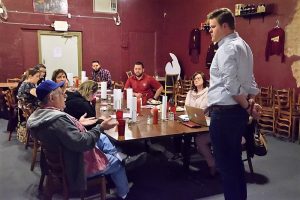
Grill on the Hill
In the morning, at Grill on the Hill, the group of 8 were concerned about the budget and how the legislature would get out of the mess they are now in with a nearly $900 million shortfall looming on the horizon for next year’s budget.
Just last week the state declared a “revenue failure” – meaning the state did not have enough money to operate under the current budget – and cut spending back for this year.

Boykin, the nurse, asked “What is the argument for keeping the Gross Production Tax at 2 percent?” She said that she was there to “mainly hear about the budget issues and the revenue deficiencies that we are having.”
The GPT is a tax on oil and gas extracted within the state.
In 2014 Gov. Mary Fallin signed a bill that gave the energy industry what was referred to at the time as an “incentive” of taxing the first three years of production on a new well at only 2 percent. Oklahoma’s Gross Production Tax is 7 percent.
Bennett explained that the incentive was meant to help companies while horizontal drilling was still experimental and risky. But since then, “it has become less expensive and there is far less risk because they know more now than they did when they first started.”
He said he thinks the continued lower tax on the first three years of production has become a “giveaway” for the oil and gas companies.
In addition, he complained that initially the lower three-year tax had been called an “incentive” but now it’s called a tax and is off the table for evaluating incentives.
Caleb Savage wanted to know what was being done to increase the gasoline tax to create an incentive to use other kinds of transportation than cars and to add to the state’s ailing revenues. He rides a bike to bus stops and then rides city busses from there.
Bennett said that there hasn’t been much done so far, but he wants to create a sliding scale on gasoline where the tax would go up when prices are down and down when prices go up so that motorists get used to the same price.
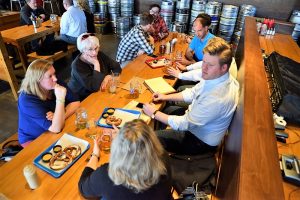
Fassler Hall
At the end of the workday at Fassler Hall near NW 10th and Hudson, on the north end of the district the questions ranged across more topics.
Some asked a series of questions about the dynamics Bennett was finding at the Capitol, specifically about why there seems to be such paralysis on budget issues. Bennett was liberal in his criticism of the Republican super majority in both houses and their strong connection to the wealthiest people in the state.
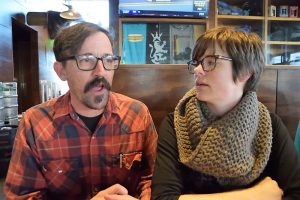
Free Press interviewed Marty Peercy and JoBeth Hamon on election night at Bennett’s watch party. They were present at the Fassler Hall meeting, too.
“I care about Forrest and the job he is doing, and he’s our representative. It’s nice, for once, to have someone who actually represents me,” said Peercy.
“Clearly education funding is very important, and services in general,” said Peercy. “We have a legislature that seems to be skewing more and more toward saving the budget by cutting services. There are other options. A lot of them don’t seem willing to entertain them.”
“My biggest concern is funding, especially the budget proposals have been around taxing people who are already overtaxed and trying to fix the budget on the backs of people who can’t really afford it,” said Hammond.
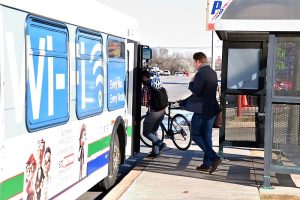
Busses instead
Bennett rode city busses to both events and to other places during the time between. It has become both a practical and governance practice.
He told Free Press he likes to use the busses because “it allows me to spend my commute to work responding to constituent emails and reading bills instead of sitting in traffic on 1-35.”
But it also gives him fresh perspectives on what is going on in the lives of workaday people.
“I do hear conversations, and talk with people, who are staring down some real challenges, issues that people in my neighborhood and neighborhoods like it face every day. And they don’t always get aired out at the Capitol,” Bennett said.
Founder, publisher, and editor of Oklahoma City Free Press. Brett continues to contribute reports and photography to this site as he runs the business.
